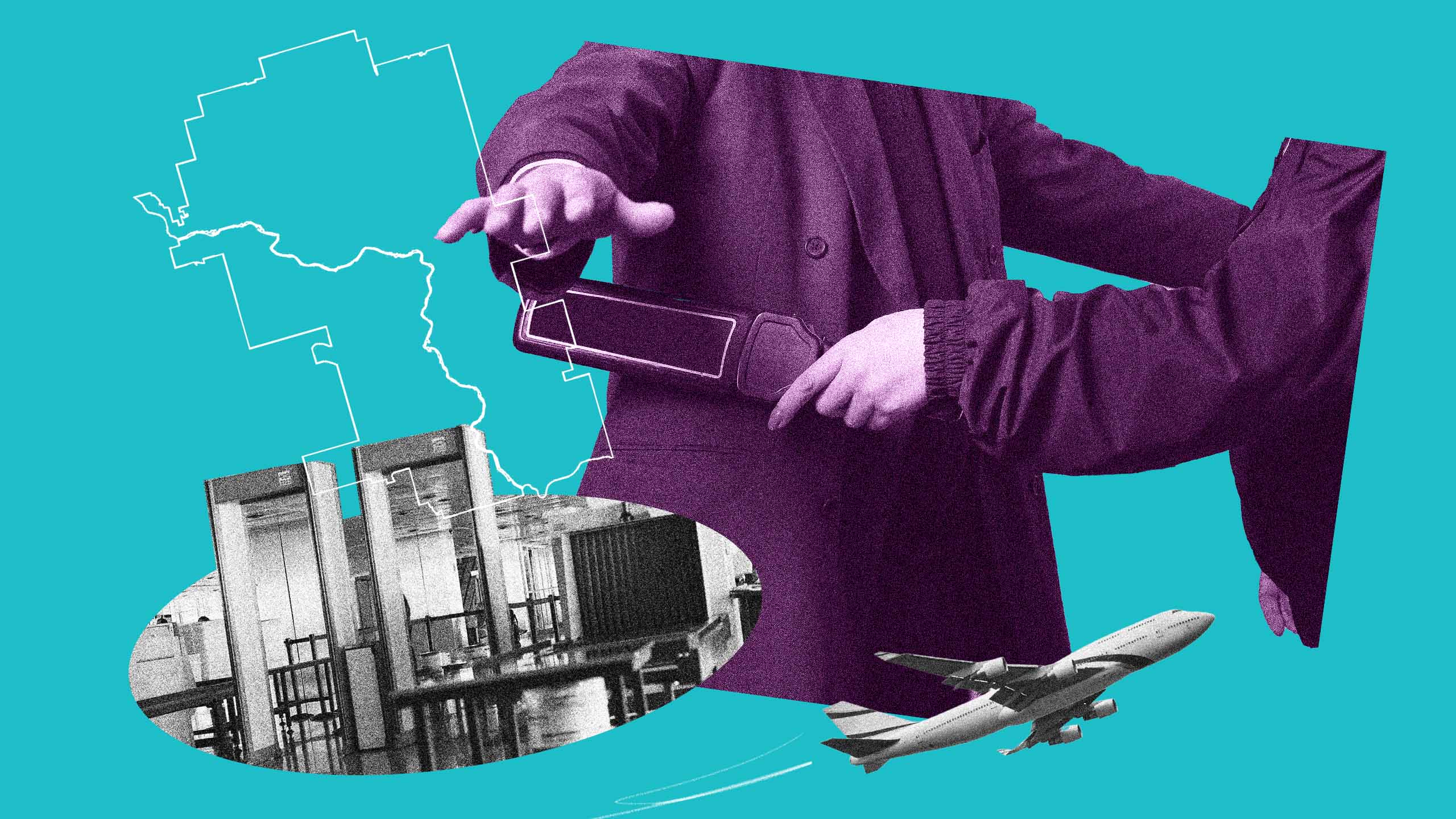Donna Battaglia says she was “expecting the worst” on a recent work trip from Calgary to Toronto. Since starting her transition six years ago, she’s avoided airports.
She’s all too aware that airports can be a nightmare for trans, non-binary and gender nonconforming travellers. The potential for misgendering, harassment and invasive questions looms at every step—from booking to check-in to security to then being trapped in the sky with hundreds of strangers.
Changes like gender-neutral passport markers and check-in options can make travelling slightly easier. But Battaglia explains that airport security—and especially the full-body scanner machines most airports use—can be particularly anxiety-inducing.
Body-scanner machines, also known as Advanced Imaging Technology, are programmed to rely on binary sex characteristics to determine whether a traveller may be concealing prohibited items or weapons underneath their clothing.
When a person enters the machine, the attendant assumes their gender at a glance. If their body doesn’t match the algorithmically set characteristics of the gender attributed to them, the scanner will flag “anomalies.” As a consequence of the system, trans travellers are frequently forced to out themselves, experience invasive strip searches and endure unnecessary pat-downs, a result Battaglia calls “embarrassing and humiliating.”
“[Trans] people have issues [at airport security] where it just becomes like, ‘You’ve told us you’re female, but you’ve got male genitalia.’ The instant thing with their training is, ‘You lied to us.’ They don’t ask why, they don’t ask what’s going on, they automatically step it up to, ‘You’ve lied to these inspectors,’” Battaglia says, describing treatment other trans women have told her they’ve faced.
Battaglia explains that telling security officers that you’re trans before entering the scanner can help minimize confrontation later, but many trans people aren’t comfortable outing themselves, let alone in a busy airport.
The reality of travelling while trans in Canada could soon be changing. On March 31, Trans Day of Visibility, the Canadian Air Transport Security Authority (CATSA) announced on Twitter that they are trialling gender-neutral body scanners at the Calgary International Airport. The location may seem surprising to some: Calgary is the most populous city in Alberta, a province that recently re-elected a provincial government which has been notoriously unfriendly to queer and trans people.
The trial run marks the first time the gender-neutral feature has been tested in Canada—airports in the U.S. began rolling it out earlier this year. The TSA announced an overhaul of their security screening process in 2022, aided by USD $18.6 million in funding from the U.S. federal government to make body scanners more accurate and less gendered.
According to CATSA, the same gender-neutral algorithm developed in the U.S. is now being trialled in Calgary for a potential rollout across Canada.
“Most passengers will not notice a change to the scanning procedure itself; however, it could reduce the number of physical pat-downs required in some cases without compromising security,” Suzanne Perseo of CATSA wrote in an emailed statement to Xtra.
“If successful and pending Transport Canada approval, we would anticipate rolling out the new software on full-body scanners in airports nationwide through a phased-in approach.”
Helen Kennedy, executive director of LGBTQ2S+ advocacy organization Egale Canada, says they’ve been concerned about body scanners since they were first introduced in 2010. “The security person makes a call [based on] how the person presents as to what their gender is and that’s not okay. It’s archaic. And it’s very stressful. And it’s discriminatory toward members of the queer community,” Kennedy tells Xtra.
Noticing the changes made by the TSA, Egale published an open letter to Transport Canada in early March—before CATSA announced the trial—calling on Canada to implement the gender-neutral technology. After publishing the letter, Egale quickly heard from CATSA that they were already preparing to test out the new scanners.
Kennedy says she was pleased to hear about the change, but wishes CATSA had done a better job at communicating their plans and consulting with the LGBTQ2S+ community—which would’ve saved them the time of writing the letter. “People should know that this is occurring,” she says.
CATSA consulted Egale on changes to their screening procedures for trans travellers in 2017. The updated policy allows trans travellers to request the gender of the officer performing a pat-down or request a “split search” where a man searches one half of their body and a woman searches the other half.
Kennedy says the new policy “wasn’t what we wanted, but it was an improvement over what they had introduced.” She told CBC at the time that she worried the policy could do more harm than good without proper training for staff to understand why it’s necessary and how to implement it. Six years later, Egale is still pushing CATSA to implement LGBTQ2S+ diversity training for new and existing officers.
Today, trans advocates are raising similar concerns over how a lack of diversity training may affect the rollout of gender-neutral body scanners.
“It’s great that we have these algorithms and that we’re creating space to break down those biases in the machine. But we risk still having bias in the operators,” says Amelia Newbert, director of learning and engagement for Calgary-based trans support network Skipping Stone.
“The new body scanners are a promising step away from the gender binary, but advocates wish more trans people would have been consulted on the change.”
Kennedy agrees. “Implementing the algorithms is only one part of a much bigger conversation,” she says. “You have to educate people around gender issues.”
Newbert says that while the new body scanners are a promising step away from the gender binary, she wishes that more trans people were consulted on the change.
“I think that was a huge oversight. I really believe when we’re making authentic action toward creating more inclusive and affirming spaces, that really has to start from the foundational principle of nothing for our community, without our community.”
She emphasizes that Skipping Stone wasn’t even aware of the trial until Xtra reached out for this story.
CATSA confirms that a meeting with Egale in late March—after they published the open letter—was the only outreach done with the LGBTQ2S+ community in the lead-up to the trial. “We are in continued discussions with Egale on ways to collaborate and improve communications with the LGBTQ2S+ community,” Perseo wrote.
At a time when anti-LGBTQ2S+ hate is on the rise internationally, addressing potential bias is more important than ever.
“A lot of us are still scared to travel anywhere because the U.S. is not friendly right now. And there are a lot of other places in the world that are not friendly, specifically for transgender people,” Terry Collins, the admin of a Facebook support group for trans and non-binary people in the Calgary area, tells Xtra.
Collins also points out that there are other barriers trans travellers face that remain unaddressed, including a lack of understanding about gender-affirming items. Packing things like dilators, packers and sex toys in a carry-on can still draw trouble from security agents.
“If you’re a trans man, and you have a false penis and you don’t wear it because you don’t want to deal with it at security so you pack it, you have to explain to them what it’s for,” Collins says.
“They’re outing you to a bunch of people that you don’t know. And now you have to spend how many hours on an airplane with them and you don’t know how they’re gonna react.”
On her recent trip to Toronto, Battaglia didn’t end up passing through the new body scanner at the Calgary airport, being directed through one of the metal detectors instead. But she believes the machines have the potential to give trans people more peace of mind while travelling, especially those who don’t have or want surgery.
“This should give a lot of relief [to trans people] that this is going to be one less thing [to worry about],” Battaglia says. “Other than being misgendered because of your voice or your appearance, at least you’re not going to get called out over body differences.”


 Why you can trust Xtra
Why you can trust Xtra


